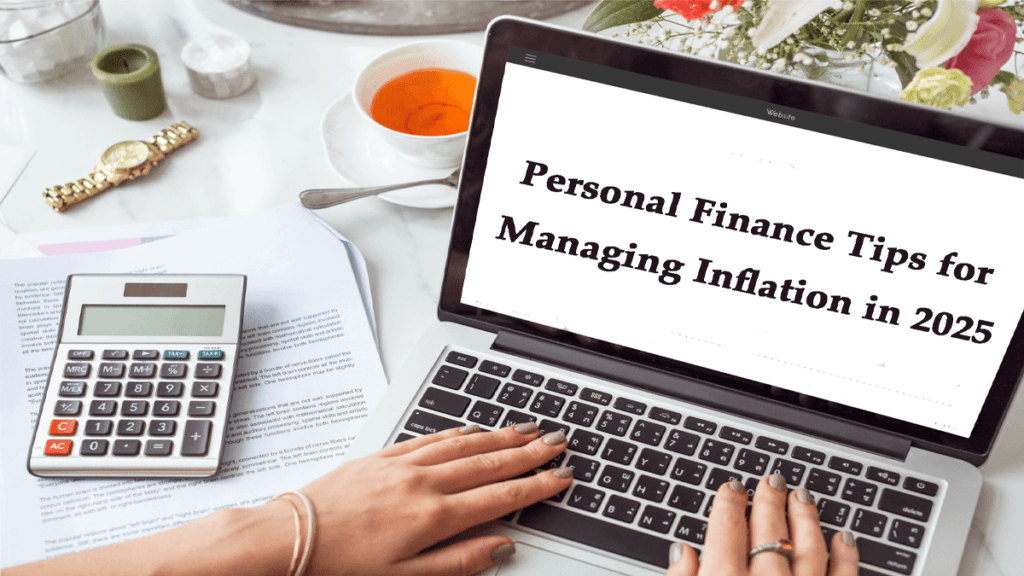Inflation remains a critical challenge in 2025, impacting daily expenses, savings, and investments. To navigate these economic shifts, adopting effective personal finance tips for 2025 is essential. With proper budgeting, diversified investments, and disciplined financial habits, you can stay ahead of inflation and secure your future.
1. Understand Inflation’s Impact in 2025
Inflation reduces your money’s purchasing power, increasing the cost of goods and services. Here’s how it affects personal finance:
- Savings Erosion: Low-interest accounts may not keep pace with inflation.
- Rising Expenses: Essential costs like food, transportation, and energy soar.
- Investment Challenges: Returns may struggle to outpace inflation rates.
Acknowledging these impacts is the first step in implementing personal finance tips for 2025 effectively.
2. Create a Flexible Budget for Inflation
A robust budget is essential for financial stability during inflationary periods.
Budgeting Tips for 2025:
- Track Every Expense: Use tools like Mint or YNAB to monitor spending.
- Focus on Essentials: Allocate funds to necessities like housing and utilities.
- Adjust Regularly: Review your budget monthly to account for rising costs.
- Inflation Buffer: Set aside extra funds for unexpected price increases.
3. Diversify Your Income Sources
In 2025, relying on a single income stream can be risky.
Ways to Boost Income:
- Freelancing: Offer services such as writing, design, or consulting.
- Side Gigs: Explore e-commerce, tutoring, or content creation.
- Passive Income: Invest in dividend-paying stocks or rental properties.
Diversifying income streams ensures financial resilience in inflationary times.
4. Invest in Inflation-Proof Assets
Traditional savings accounts may not suffice during inflation. Explore alternatives for better returns.
Inflation-Resistant Investment Options:
- Treasury Inflation-Protected Securities (TIPS): Bonds that adjust with inflation.
- Equities: Stock investments often outpace inflation over the long term.
- Real Estate: Property values typically increase, offering a hedge.
- Precious Metals: Gold and silver retain value in uncertain times.
5. Strategize Debt Management
Inflation can lead to higher interest rates, making debt more expensive.
Debt Reduction Tips:
- Prioritize High-Interest Debt: Pay off credit cards and personal loans first.
- Refinance Loans: If possible, lock in lower interest rates.
- Avoid New Debt: Stick to cash or debit for purchases when feasible.
Reducing debt frees up resources for savings and investments.
6. Optimize Spending Habits
Adopting smart spending habits helps you save money despite inflation.
Money-Saving Strategies:
- Buy in Bulk: Save on per-unit costs for essentials.
- Switch to Generics: Opt for store brands instead of premium products.
- Leverage Cashback Apps: Use platforms like Rakuten or Honey for savings.
- Delay Non-Essential Purchases: Wait for better deals on big-ticket items.
7. Utilize Technology for Financial Planning
In 2025, technology plays a vital role in effective money management.
Recommended Tools:
- Budgeting Apps: Mint, Goodbudget, or PocketGuard.
- Investment Platforms: Robinhood, Fidelity, or E*TRADE.
- Expense Trackers: Spendee or Wally for meticulous tracking.
- Financial News Apps: Bloomberg and CNBC for real-time updates.
8. Reassess Insurance Policies
Ensure your insurance coverage aligns with your current needs and inflation trends.
Insurance Tips:
- Review Coverage: Confirm your policies meet current requirements.
- Shop Around: Compare rates and benefits to find better deals.
- Bundle Plans: Combine home and auto insurance to reduce premiums.
9. Strengthen Your Emergency Fund
An emergency fund is crucial for financial stability during inflation.
How to Build an Emergency Fund:
- Set a Goal: Aim for 6 months’ worth of essential expenses.
- Automate Savings: Schedule regular transfers to a high-yield account.
- Cut Temporary Costs: Reduce non-essential spending to grow your fund faster.
10. Stay Informed About Economic Trends
Awareness of economic changes helps you make smarter financial decisions.
Staying Informed:
- Follow Financial News: Track inflation rates, market movements, and interest rate trends.
- Learn Continuously: Read books, attend webinars, or listen to finance podcasts.
- Consult Experts: Seek advice from financial advisors or planners.
Conclusion
Inflation in 2025 presents challenges, but with a proactive approach, you can protect your financial health. By budgeting wisely, diversifying your income, investing smartly, and staying informed, you can thrive even in challenging economic conditions. Use these personal finance tips for 2025 to secure your future and achieve financial stability.
FAQs
What are the best investment options for inflation in 2025?
Treasury Inflation-Protected Securities (TIPS), equities, real estate, and gold are strong choices.
How can I adjust my budget to tackle inflation?
Focus on tracking expenses, prioritizing essentials, and adding an inflation buffer.
Should I pay off debt or save during inflation?
Pay off high-interest debt first while maintaining a small emergency fund.
How can I save on everyday expenses in 2025?
Buy in bulk, switch to generic products, and use cashback apps for savings.
Is investing during inflation a good idea?
Yes, investing in inflation-proof assets can help grow wealth and maintain purchasing power.
Manikesh Tripathi is a seasoned Top SEO expert, digital strategist, and founder of Latest News Post. With a passion for innovation, he helps businesses dominate search rankings through cutting-edge SEO techniques, AI-driven strategies, and data-backed insights. Stay ahead of the curve with his expert tips, industry trends, and growth hacks.

